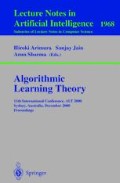Abstract
While Kolmogorov complexity is the accepted absolute measure of information content of an individual finite object, a similarly absolute notion is needed for the relation between an individual data sample and an individual model summarizing the information in the data, for example, a finite set where the data sample typically came from. The statistical theory based on such relations between individual objects can be called algorithmic statistics, in contrast to ordinary statistical theory that deals with relations between probabilistic ensembles. We develop a new algorithmic theory of typical statistic, sufficient statistic, and minimal suffcient statistic.
The paper was partly written during this author’s visit at CWI.
Access this chapter
Tax calculation will be finalised at checkout
Purchases are for personal use only
Preview
Unable to display preview. Download preview PDF.
References
A.R. Barron, J. Rissanen, and B. Yu, The minimum description length principle in coding and modeling, IEEE Trans. Inform. Theory, IT-44:6(1998), 2743-2760.
T.M. Cover, Kolmogorov complexity, data compression, and inference, pp. 23–33 in: The Impact of Processing Techniques on Communications, J.K. Skwirzynski, Ed., Martinus Nijhoff Publishers, 1985.
T.M. Cover and J.A. Thomas, Elements of Information Theory, Wiley, New York, 1991.
R. A. Fisher, On the mathematical foundations of theoretical statistics, Philosophical Transactions of the Royal Society of London, Ser. A, 222(1922), 309–368.
Q. Gao, M. Li and P.M.B. Vitányi, Applying MDL to learn best model granularity, Artificial Intelligence, To appear. http://xxx.lanl.gov/abs/physics/0005062
P. Gács, J. Tromp, P. Vitányi, Algorithmic statistics, Submitted. http://xxx.lanl.gov/abs/math.PR/0006233
M. Li and P.M.B. Vitányi, An Introduction to Kolmogorov Complexity and its Applications, Springer-Verlag, New York, 2nd Edition, 1997.
A.N. Kolmogorov, Three approaches to the quantitative definition of information, Problems Inform. Transmission 1:1 (1965) 1–7.
A.N._Kolmogorov, On logical foundations of probability theory, Pp. 1–5 in: Probability Theory and Mathematical Statistics, Lect. Notes Math., Vol. 1021, K. Itô and Yu.V. Prokhorov, Eds., Springer-Verlag, Heidelberg, 1983.
A.N. Kolmogorov and V.A. Uspensky, Algorithms and Randomness, SIAM Theory Probab. Appl., 32:3(1988), 389–412.
L.A. Levin, Laws of information conservation (nongrowth) and aspects of the foundation of probability theory, Problems Inform. Transmission 10:3(1974), 206–210.
L.A. Levin Randomness conservation inequalities: information and independence in mathematical theories, Information and Control 61 (1984) 15–37.
P. Martin-Löf, The definition of random sequences, Inform. Contr., 9(1966), 602–619.
A.Kh. Shen, The concept of (α, β)-stochasticity in the Kolmogorov sense, and its properties, Soviet Math. Dokl., 28:1(1983), 295–299.
A.Kh. Shen, Discussion on Kolmogorov complexity and statistical analysis, The Computer Journal, 42:4(1999), 340–342.
P.M.B. Vitányi and M. Li, Minimum Description Length Induction, Bayesianism, and Kolmogorov Complexity, IEEE Trans. Inform. Theory, IT-46:2(2000), 446–464.
V.V. V’yugin, On the defect of randomness of a finite object with respect to measures with given complexity bounds, SIAM Theory Probab. Appl., 32:3(1987), 508–512.
V.V. V’yugin, Algorithmic complexity and stochastic properties of finite binary sequences, The Computer Journal, 42:4(1999), 294–317.
Author information
Authors and Affiliations
Editor information
Editors and Affiliations
Rights and permissions
Copyright information
© 2000 Springer-Verlag Berlin Heidelberg
About this paper
Cite this paper
Gács, P., Tromp, J., Vitányi, P. (2000). Towards an Algorithmic Statistics. In: Arimura, H., Jain, S., Sharma, A. (eds) Algorithmic Learning Theory. ALT 2000. Lecture Notes in Computer Science(), vol 1968. Springer, Berlin, Heidelberg. https://doi.org/10.1007/3-540-40992-0_4
Download citation
DOI: https://doi.org/10.1007/3-540-40992-0_4
Published:
Publisher Name: Springer, Berlin, Heidelberg
Print ISBN: 978-3-540-41237-3
Online ISBN: 978-3-540-40992-2
eBook Packages: Springer Book Archive

